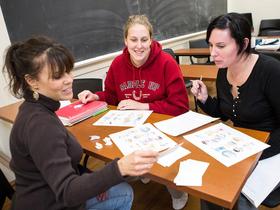First-generation college students face many challenges when they are the first in their family to head off to the ivied halls of higher education. While that first trip to a college campus can be exciting, it can also be filled with anxiety and uncertainty. These college students don't have anyone in their families to offer support and first-hand advice on succeeding in post-secondary education. However, these first-generation students are often much more successful in their academic endeavors when colleges understand and meet their needs during their first few weeks on campus and beyond. This article looks at some challenges first-generation community college students face and what schools can do to make the transition a little easier.
What is a First-Generation Student?
First-generation community college students are the first in their immediate family to attend postsecondary school after high school, according to a report at ERIC Digests. This means that neither of the student's parents has attended college. Those whose parents have an associate degree would not be considered first-generation college students, even if the parent never went on to earn a bachelor's degree. Many first-generation community college students decide to earn a two-year degree before transferring to a four-year institution. However, only a small percentage of community college students actually achieve their transfer goals.
Many first-generation students come to community colleges from different backgrounds and cultures. According to a report from the American Association of Community Colleges, approximately 36 percent of first-generation students are members of minorities. More than half of all Hispanic college students are first-generation, while 43 percent of Native Americans and 41 percent of African Americans fall into this category. In contrast, the percentages of white and Asian students that are first-generation are typically much lower.
According to the AACC report, other common characteristics of first-generation community college students pose distinct challenges to this student body. Some of these features include:
- Most first-generation community college students are not of the traditional college age. Many have been out of school for some time and are just returning to the hallowed halls of academia, making it difficult to get back into "study mode."
- Most first-generation community college students work full or part-time while attending college classes. This places additional time and financial restraints on these students, making academic success much more elusive.
- A number of first-generation community college students are taking a smaller load of courses, probably in an effort to balance work and family responsibilities, as well as schoolwork.
With a unique demographic to contend with, there are many challenges that are unique to first-generation community college students who want to achieve academic success.
What are the Hurdles?
First-generation community college students face numerous hurdles that are unique to their specific situations. Unfortunately, these hurdles can sometimes become insurmountable, leading first-generation students to quit school before completing their degree programs. According to a page on the University of Illinois website, some of the difficulties first-generation community college students face include:
- Financial responsibility – Many first-generation college students face the financial burden of their education alone, which can be difficult to overcome.
- Guilty pleasure – As the first person in their family to attend college, some of these students feel a sense of guilt over their opportunity. While this guilt can motivate some to succeed, others have difficulty overcoming negative emotions.
- Embarrassment – Some first-generation college students may feel embarrassed or ashamed about their advanced age or socioeconomic status, which sets them apart from their peers.
- Confusion – For students who have been out of the academic sphere for some time, getting back into the swing of school and studies can be challenging. In addition, some students in this category are simply unprepared for the red tape and bureaucracy of college administration.
- Apprehension – The fear of leaving home and familiar surroundings can be frightening for students heading to college right from high school. This is especially true for minority students that will be facing a whole new culture in addition to the college scene.
While there are many hurdles for first-generation college students getting ready to hit the campus, there is help available as well. Many colleges are beginning to recognize this demographic's unique challenges and are rising up to help students meet the challenge with support groups and special programs.
In this video, we hear from three first-generation students about their experiences.
"First Generation" Project
Seattle Central Community College launched a new program to inspire first-generation students to finish their postsecondary education. Dubbed the "First Generation" Project, this program is designed to provide the support these students need to survive the tough transition into college life.
According to The Seattle Medium, the cornerstone of the project is a website that provides true stories from Seattle Central's students and staff who were first-generation students themselves.
TRIO
At Lansing Community College in Michigan, the TRIO program was created to help first-generation college students succeed in school. According to the college website, TRIO offers academic assistance, personal counseling, financial guidance, and many additional services. All of the services are available free of charge to eligible students.
This video offers a look at Lansing Community College's TRIO program.
First-generation college students may have a challenging road, but it is far from impossible. With the right attitude and plenty of outside support, these students can be the first in their families to attend college and receive their completed degrees.
Questions? Contact us on Facebook. @communitycollegereview
#FirstGenCC #CommunityCollegeSuccess #SupportingFirstGen #EmpoweringFirstGen #BreakingBarriersCC















